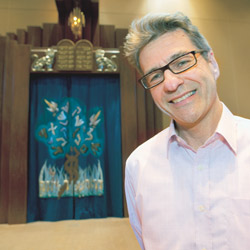Tale of two shuls
ART Feinman, the recently appointed executive director of Progressive synagogue Temple Beth Israel (TBI) in Melbourne, sees no conflict between his links to Conservative shul Kehilat Nitzan and his new employer TBI. He said the "post-denominational" concept, used by TBI's Rabbi Fred Morgan, describes a community where strict boundaries of shul identification are mellowing.

PETER KOHN
ART Feinman, the recently appointed executive director of Progressive synagogue Temple Beth Israel (TBI) in Melbourne, sees no conflict between his links to Conservative shul Kehilat Nitzan and his new employer TBI.
Feinman said the “post-denominational” concept, used by TBI’s Rabbi Fred Morgan, describes a community where strict boundaries of shul identification are mellowing.
“As my wife says [of synagogue rivalry], ‘we’re over it’. To me, this isn’t a marketing exercise of poaching members from one to the other, it’s an immersion exercise, where we immerse ourselves into what the community needs and wants,” he told The AJN this week.
Feinman, an ex-New Yorker who left behind a career on Wall Street and once toyed with the idea of becoming a stand-up comic, immigrated to Australia in an unexpected way.
His Australian-born wife, Dr Gish New, returned to Melbourne to become director of cardiology at Box Hill Hospital and he joined her, landing a job in business management.
After settling in Melbourne in 2002, the couple, who have been married for four years, went “shul shopping”, he said. They now enjoy the different flavours of the newer shtiebels that have sprung up, as well as a strong involvement with Kehilat Nitzan and TBI.
But when he accepted the position at TBI, Feinman resigned from the Kehilat Nitzan board to avoid any conflicts of interest, although he attends services regularly.
Feinman said that as TBI’s executive director, he will help implement Rabbi Morgan’s vision to continue transforming the synagogue into a versatile community centre.
“It needs to be a Beit Tefillah [house of prayer] but also a Beit Midrash [house of study] and a Beit Knesset [meeting place],” Feinman said.
TBI’s human resources, including its rabbinic team and congregation, are its greatest assets at this time of economic uncertainty, he said.
Asked how he would follow the previous executive director Alan Samuel’s 15 years in the job, he said: “No-one will ever fill Alan Samuel’s shoes.”

comments